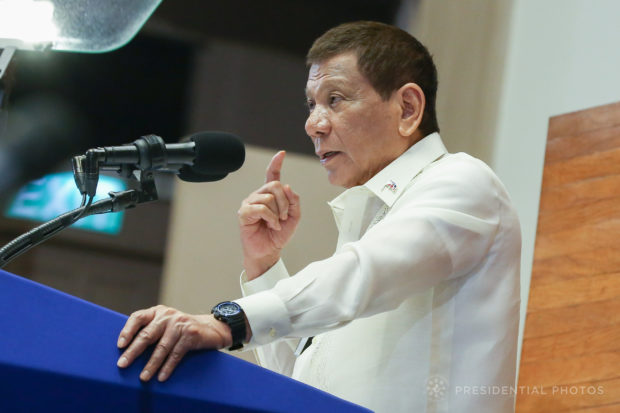Duterte target to deliver key campaign promises ‘unrealistic’ – Ateneo study
MANILA, Philippines – President Rodrigo Duterte “seriously underestimated” the challenges in ending crime, corruption, and the drug problem, which is why he has been unable to make good on his campaign promises with less than a year to go before leaving office, according to a new Ateneo School of Government (Asog) study.
The fourth working paper, written by former Education Secretary Edilberto de Jesus for the Asog series titled “Duterte at 5: The Duterte Administration By The Numbers,” focused on the government’s performance when it came to the president’s three key campaign promises: eradicate crime, corruption and illegal drugs within six months.
De Jesus said that, while Duterte’s timetable was “unrealistic,” his priorities were unassailable.
But even so, the president largely failed to deliver because of his tendency “to approach complex issues as mainly law enforcement problems.”
“Their resolution thus became overly reliant on the capacity of police and security personnel that the President could trust,” De Jesus noted. “His strategy did not take advantage of the lessons learned around the world and from its own experience in addressing impunity and engaging citizen support in controlling corruption.”
This was most apparent from the way he conducted his war on drugs, now under scrutiny by the International Criminal Court for alleged crimes against humanity.
At the onset of his presidency, Duterte warned that the country would turn into a “narco-state” if he did not implement on a national level his signature antidrug campaign in Davao City, where he served as mayor.
Five years and thousands of deaths later, however, “shabu” (crystal meth) continues to be a major drug concern in the Philippines, according to the UN Office on Drugs and Crime.
Citing the country’s failure to sustain its rankings in the corruption perception index, ease of doing business, and global competitiveness, the study showed that the President did not fare better in his anti-corruption drive.
This was partly due to his tendency to “recycle” government officials who were facing criminal charges, and his propensity for secrecy especially when it came to his own wealth.
Malacañang earlier said that only three of Duterte’s “close friends” were ever reappointed following their involvement in a scandal although the study pointed to five out of 20 sacked officials.
Basis of selection
“The implicit affirmation of the KKK (kamag-anak, kaklase, kaprobinsiya) basis of selection, regardless of potential conflicts of interest, also underlined why such choices were problematic,” De Jesus said.
Some of the president’s more controversial reappointees, he added, were former justice secretary and fraternity brother Vitaliano Aguirre II who was named to the National Police Commission in January 2021 and former Presidential Communications Operations Office Assistant Secretary Mocha Uson who became Overseas Workers Welfare Administration deputy administrator in 2019.
Duterte’s refusal to disclose his statement of assets, liabilities, and net worth (SALN) also tainted his promise to stop corruption, the study said.
This was further exacerbated by the appointment of Samuel Martires to the Office of the Ombudsman, where he made the processing of SALNs even more opaque.
Human rights crisis
For women’s rights advocates, Duterte’s biggest legacy was a persisting “human rights crisis” that ran counter to his campaign promises in 2016.
At a press briefing on Monday, a week before Duterte’s sixth and final State of the Nation Address, the Philippine Alliance for Human Rights Advocates and iDefend said the brutal conduct of his drug war and counterinsurgency campaign, as well as his “failed” approach to the COVID-19 pandemic, had inflicted irreparable harm especially to the country’s women and children.
From July 2016 to December 2019, both groups said they recorded 122 children who were killed in the anti-drug campaign. That figure, however, was expected to have gone up last year despite the pandemic, said iDefend chair Rowena Legaspi.
“The past five years have brought nothing but bloodshed and death to the country,” Legaspi said. “Contrary to [the President’s] promise to protect the youth as the future of this country, his administration was in fact the killer of dreams of those who were killed, tortured or disappeared in his war on drugs.”
Jelen Paclarin of the Women’s Legal and Human Rights Bureau noted that the Duterte administration would also leave behind a broken justice system, made worse by the passage of the anti-terrorism law and his cooptation of the courts.
Citing the World Justice Project’s rule of law index, Paclarin said the country still ranked 91st out of 128 countries, and 13th out of 15 in the Southeast Asia region.



















